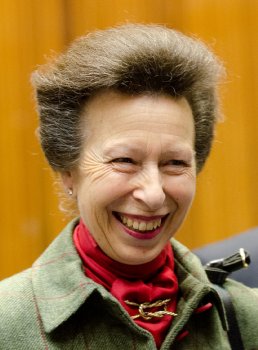
The University of Ulster today welcomed Her Royal Highness The Princess Royal to its Jordanstown campus as part of her day-long visit to Northern Ireland.
The Princess Royal’s visit marked the 40th anniversary of the introduction of occupational therapy education at the University of Ulster – the only provider of degree-level occupational therapy education in Northern Ireland. The Princess Royal is Patron of the College of Occupational Therapists, the UK’s professional body for occupational therapists.
She was greeted by Joan Christie, Lord Lieutenant of County Antrim, and was welcomed to the campus by the Vice-Chancellor, Professor Richard Barnett, and Professor Alastair Adair, Provost of the Jordanstown campus.
While on campus, the Princess Royal – who was joined by the Secretary of State for Northern Ireland, Theresa Villiers MP, toured a workshop and exhibition showcasing the work of the University in the fields of occupational therapy, research innovation and knowledge transfer. She met University staff and students as well as senior representatives from the College of Occupational Therapists, charities, voluntary and community groups and companies whose work has benefited from the knowledge, expertise and innovation of University researchers.
The Vice-Chancellor, Professor Richard Barnett, said: “I am delighted once again to welcome HRH The Princess Royal on her third visit to the University of Ulster. As in her previous visits, she showed great interest in and enthusiasm for our work.
"We are at the forefront of teaching and research in occupational therapy, and I am pleased that we were able to showcase these important aspects of our activity.”
University of Ulster academic Dr Suzanne Martin, who is a Council member and Chair of the R&D Board for the College of Occupational Therapists, said:
"Today has been a great opportunity to celebrate the hard work of Occupational Therapy academics, who are collaborating with healthcare businesses and the social economy healthcare providers to improve the outcomes of healthcare interventions within Northern Ireland.
“The Office of Innovation at the University guides the academics on Invest Northern Ireland Innovation Vouchers and Knowledge Transfer Partnership funding which has enabled staff to share knowledge and build research projects on a wide range of topics – for example working with Limavady-based chair manufacturers Seating Matters to explore the impact of their chairs and prescribed seating assessments on older people living in nursing homes.
“In addition to this, we have a long standing track record of partnership with the Cedar Foundation, who are now collaborating on Brain Computer Interface projects to enable people with acquired brain injury to gain access to a computer using just their brain waves to control the mouse."
Julia Scott, Chief Executive, College of Occupational Therapists said:
“The University of Ulster is a significant part of occupational therapy’s history and it is thanks to the pioneering work of Joy Rook that we welcome many more students into the profession today.
“The visit of HRH The Princess Royal visit is a momentous occasion for staff and students and recognises the strong partnerships between the University and its local community.
"The work of the academic staff exemplifies the vital importance of the collaboration between research, education and best practice all of which support the health and wellbeing of Northern Ireland’s population.”
ENDS
Images from the Royal visit can be viewed at:
http://www.flickr.com/photos/universityofulster/sets/72157637588584066/
Audio of the Princess Royal's speech at the celebratory event can be heard at :
https://audioboo.fm/boos/1723559-princess-royal-marks-40-years-of-occupational-therapy-at-ulster
Notes for editors:
1. Occupational therapy education at the University of Ulster
In 1972, Joy Rook, who started the first Occupational Therapy school in Ireland - came to Ulster to set up the first and, still today, the only occupational therapy programme in Northern Ireland.
Occupational therapy education commenced at the University of Ulster on the Jordanstown campus, in September 1973. Miss Rook began the course with 20 students and two other occupational therapy lecturers to start the Diploma of the College of Occupational Therapists.
It was the merger in 1984 of the New University of Ulster and the Ulster Polytechnic into the present University of Ulster that supported the development in occupational therapy education to degree level, which began in 1986. This was the first Honours degree programme in occupational therapy in the UK.
There have been twenty-four graduating cohorts from the Honours degree programme to date. Graduates obtain the academic award of a BSc Honours degree.
2. HRH The Princess Royal
The Princess Royal last visited the University in 2009, when she visited the High Performance Sports Centre at Jordanstown, and previously in 2003, when she opened a new library at the University’s Magee campus in Derry~Londonderry.
3. The College of Occupational Therapists
The College of Occupational Therapists is the professional body for 29,000 occupational therapists and support staff in the UK. It champions the vital work of occupational therapy staff, promoting value, excellence and innovation across the profession.
4 Occupational Therapy
Occupational therapy provides practical support to people with physical and mental illness, disability, long-term conditions, or those experiencing the effects of ageing, enabling them to do the things they need or want to do. It helps people of all ages to carry out practical and purposeful activities (often referred to as ‘occupation’). This could be essential day to day tasks - such as dressing, cooking, going shopping, to the things that make us who we are - our job, interests, hobbies and relationships.
Occupational therapy considers all our needs - e.g. physical, psychological, social and environmental - and helps to increase people’s independence and satisfaction in all aspects of life.

















